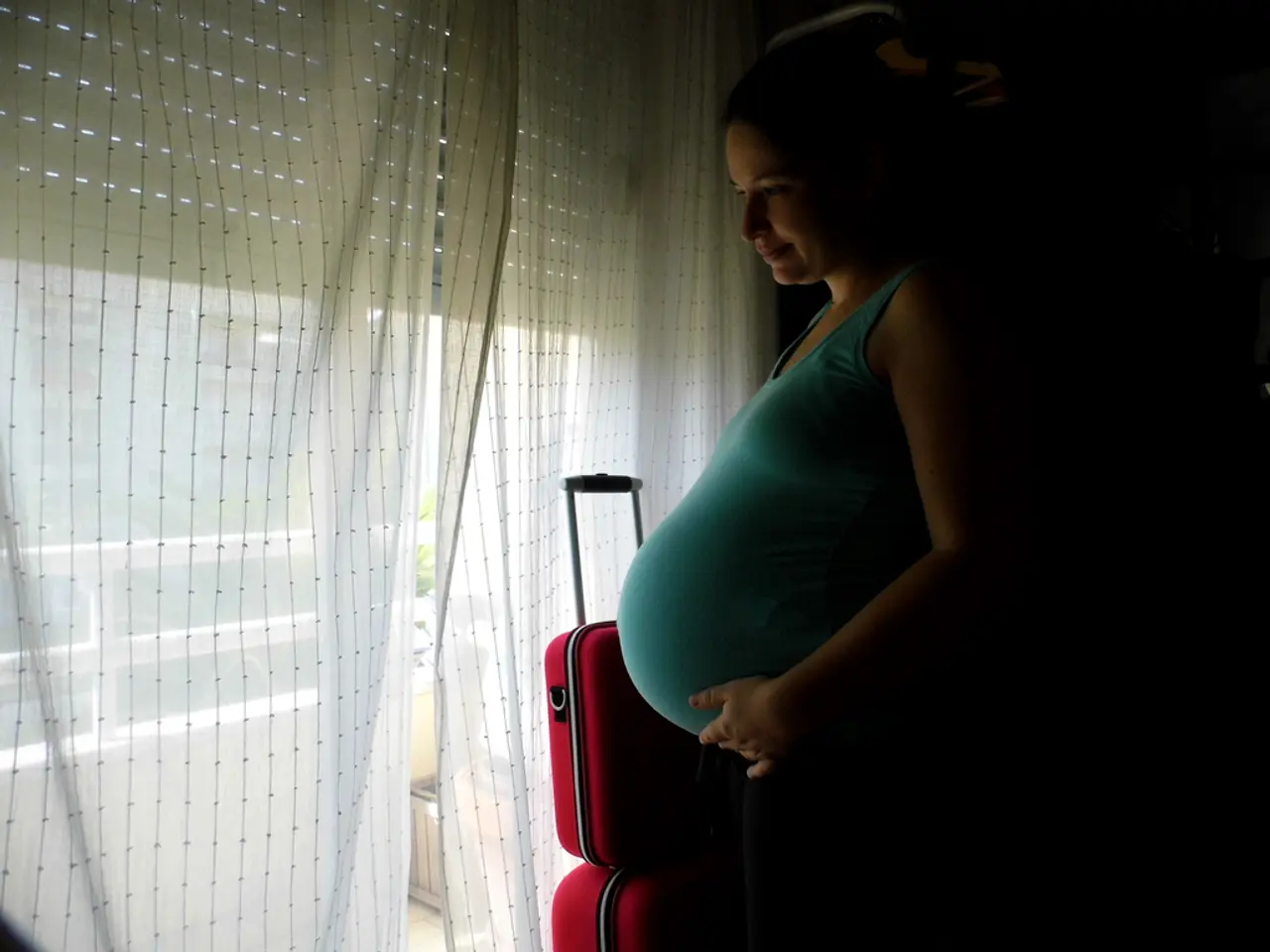Pregnancy-induced sneezing: Explanation of the cause and impact on the unborn child
Pregnancy can bring about a myriad of changes, and one common symptom that many expectant mothers experience is sneezing. While this may seem harmless, understanding the causes and effective management strategies is crucial for the wellbeing of both mother and baby.
Sneezing during pregnancy is often attributed to hormonal and immune changes. The most frequent cause is pregnancy rhinitis, a condition where increased blood volume causes swelling of blood vessels in the nose and overproduction of mucus, leading to nasal congestion, irritation, and sneezing. This typically begins in the first trimester and resolves after delivery [1][2].
Pregnancy also suppresses the immune system, making women more susceptible to colds and respiratory infections, which cause sneezing and cold-like symptoms [1][3]. Allergies, whether indoor or seasonal, can worsen or develop during pregnancy, triggering sneezing fits [1][3]. Hormonal fluctuations and sinus infections can also contribute.
Fortunately, there are several home remedies and precautions that are effective and safe for pregnant women. Steam inhalation or using a humidifier can ease nasal congestion [2][3]. Saline nasal sprays or homemade saline rinses can clear mucus and reduce inflammation safely [2]. Warm fluids such as ginger tea or honey with ginger juice can soothe the throat and help clear mucus [2][4]. Gargling with salt water (possibly with turmeric) helps reduce upper respiratory infections and loosen phlegm [4]. Staying well hydrated by drinking plenty of water thins mucus secretions [4].
Avoiding exposure to known allergens like dust or pet dander and maintaining good hygiene can prevent infections. If sneezing is accompanied by breathing difficulties or prolonged discomfort, immediate medical attention is necessary as severe nasal congestion or asthma could affect oxygen supply to the fetus [3].
While most cases of sneezing during pregnancy are harmless, it can be a symptom of an illness or a more significant problem. Pregnant individuals should seek immediate medical attention if they have a fever of 102°F or higher, trouble breathing, chest pain, coughing up yellow or green mucus, blowing colored mucus from the nose, wheezing, loss of appetite, inability to sleep, a severe headache, or any other concerning symptoms along with sneezing [5].
It's essential to remember that pregnant individuals have weaker immune systems, making them more susceptible to colds, flu, and other illnesses that may last longer and be more severe [6]. The American Pregnancy Association recommends limiting over-the-counter medications during pregnancy, making many common cold medications off-limits for pregnant individuals [7]. If sneezing indicates a more severe problem, there may be risks such as miscarriage, low birth weight, and premature birth [8].
Pregnant women should talk to their doctor about the best ways to avoid getting ill during pregnancy, and most doctors recommend a flu shot to prevent the flu while pregnant [9]. Colds are generally harmless during pregnancy, but the flu or illnesses causing a fever can be dangerous for both mother and baby [10].
In conclusion, sneezing during pregnancy is common and generally harmless, though it can be uncomfortable. Proper home care and avoiding triggers help manage the symptoms effectively without risk to mother or baby [1][2][3][4].
- Sneezing can be a common symptom for many expectant mothers due to hormonal and immune changes.
- Pregnancy rhinitis, characterized by nasal congestion and sneezing, often begins in the first trimester.
- The increased blood volume in pregnancy causes swelling of blood vessels in the nose, leading to overproduction of mucus and sneezing.
- Allergies can also trigger sneezing fits during pregnancy, whether indoor or seasonal.
- Hormonal fluctuations and sinus infections can contribute to sneezing in pregnancy.
- Steam inhalation and using humidifiers can help alleviate nasal congestion and sneezing.
- Saline nasal sprays or homemade saline rinses can clear mucus and reduce inflammation safely.
- Warm fluids like ginger tea or honey with ginger juice can soothe the throat and help clear mucus.
- Gargling with salt water and turmeric can help reduce upper respiratory infections and loosen phlegm.
- Staying well-hydrated by drinking plenty of water thins mucus secretions, easing symptoms of congestion and sneezing.
- Avoiding exposure to known allergens like dust or pet dander, and maintaining good hygiene can prevent infections.
- If sneezing is accompanied by breathing difficulties or prolonged discomfort, immediate medical attention is necessary to ensure fetal oxygen supply.
- Pregnant individuals should seek medical attention immediately if they experience a fever of 102°F or higher, trouble breathing, chest pain, coughing up yellow or green mucus, blowing colored mucus from the nose, wheezing, loss of appetite, inability to sleep, a severe headache, or any other concerning symptoms along with sneezing.
- Pregnant individuals have weaker immune systems, making them more susceptible to colds, flu, and other illnesses that may last longer and be more severe.
- The American Pregnancy Association recommends limiting over-the-counter medications during pregnancy, making many common cold medications unsafe for pregnant individuals.
- If sneezing indicates a more severe problem, risks such as miscarriage, low birth weight, and premature birth may occur.
- Pregnant women should talk to their doctor about the best ways to avoid getting ill during pregnancy, and most doctors recommend a flu shot to prevent the flu while pregnant.
- Colds are generally harmless during pregnancy, but the flu or illnesses causing a fever can be dangerous for both mother and baby.







